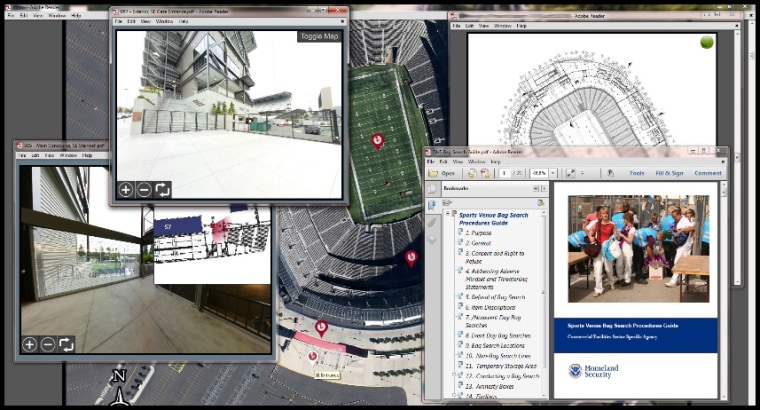Call it a Prevent Defense.
While players, coaches and fans of the Denver Broncos and the Carolina Panthers didn't know for sure until just last week that they'd be in Santa Clara, California, for Sunday's Super Bowl, thousands of other people have known they'd be there for three years — the security personnel who'll be blanketing not just Levi's Stadium but also the entire San Francisco Bay Area.
For more than a decade, the Super Bowl has been classified as a Level 1 national security event — meaning it's considered a credible target for terrorists. That's why the National Football League says it's hired more than 4,000 private security professionals to bolster the thousands of federal, state and local officers already swarming the area.
A Joint Special Event Threat Assessment this week from the FBI and the Department of Homeland Security said there was no information to indicate a specific threat to Super Bowl 50 or its surrounding events.
But San Francisco Police Chief Greg Suhr told NBC News that "the events that happened in San Bernardino and in Paris" illustrate how quickly threats have been escalating "in an uncertain world."
The suicide attackers in Paris in November included a man who blew himself up near the Stade de France during an international soccer match between France and Germany.
So the alphabet soup of federal agencies working the Super Bowl on Sunday will go way beyond the familiar letters of FBI, DHS and TSA.
There's NORAD — the North American Aerospace Defense Command — which will be enforcing a no-fly zone over the region and coordinating military aircraft patrolling the skies, including UH-60 Black Hawk helicopters.
And there's DNDO — the Domestic Nuclear Detection Office — which is deploying radiological and nuclear detection "surge" equipment to sniff out nuclear threats.
Not to mention CBP, ICE, FEMA, NPPD, NBIC, HSI, IPR and many, many others — about 60 agencies in all.
"This is by far the most significant security presence we've had at any event in the Bay Area for sure," Steve Baxter, a regional watch commander for U.S. Customs and Border Protection, told NBC News.
If you're among the 1 million or so visitors to the area for Super Bowl ,you'll be sniffed by bomb dogs, swept by X-ray machines, monitored by thousands of cameras and watched over by sharpshooters on rooftops.
And your phones and computers will be closely tracked. Cybersecurity is a big concern, DHS said Wednesday — so much so that it confirmed that it will have sensors inside the city of Santa Clara's network in addition to all its other technology to spot cyber or communications threats in real time.
It's a small part of what federal authorities call the Computer-Based Assessment Tool, an all-encompassing intelligence gathering system designed to provide "immersive video, geospatial and hypermedia data" on all critical facilities and transportation routes, according to DHS.

It'll all be monitored in a command center on a sophisticated array that looks like something you'd see in a spy movie.
"We're going to be so hardened around here," said Suhr, the San Francisco police chief.
"We want to send a clear message to anybody that might have plans to do something ... that this is not some place where somebody should come and make a problem," he said.

